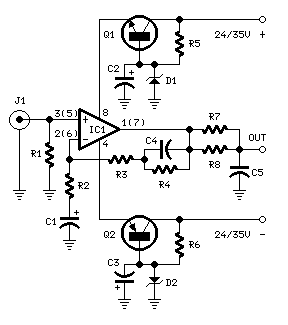Phono Preamplifier Circuit
Parts:
R1 47K 1/4W Resistor
R2 100R 1/4W Resistor
R3 6K8 1/4W Resistor
R4 68K 1/4W Resistor
R5,R6 2K7 1/4W Resistor
R7 2K2 1/4W Resistor
R8 39K 1/4W Resistor
C1-C3 100uF 25V Electrolytic Capacitors
C4,C5 47nF 63V Polyester Capacitors 5% tolerance
D1,D2 BZX79C18 18V 500mW Zener Diodes
IC1 LM833 Low noise Dual Op-amp
Q1 BC337 45V 800mA NPN Transistor
Q2 BC327 45V 800mA PNP Transistor
J1 RCA audio input socket
Comments:
In recent years, following CD's introduction, vinyl recordings are almost disappeared. Nevertheless, a phono preamplifier is still useful for listening old vinyl discs from a well preserved collection. This simple but efficient circuit devised for cheap moving-magnet cartridges, can be used in connection with both audio power amplifiers shown in preceding pages, featuring low noise, good RIAA frequency response curve, low distortion and good high frequency transients behaviour due to passive equalization in the 1 to 20KHz range. Transistors and associated components provide � 18V supply to the op-amp, improving headroom and maximum output voltage.
Notes:
R2, R3, R4, R7, R8, C4 & C5 should be low tolerance types.
Schematic shows left channel and power supply.
For stereo operation R1, R2, R3, R4, R7, R8; J1; C1, C4 & C5 must be doubled.
Numbers in parentheses show IC1 right channel pin connections.
Technical data:
Sensitivity @ 1KHz: 2.5mV RMS input for 200mV RMS output
Max. input voltage @ 1KHz: 120mV RMS
Max. input voltage @ 10KHz: 141mV RMS
Max. input voltage @ 20KHz: 127mV RMS
Frequency response @ 1V RMS output: 100Hz to 20KHz � 0.5dB; -0.75dB @ 30Hz
Total harmonic distortion @ 1KHz and 6V RMS output: 0.006%
Total harmonic distortion @10KHz and 1V RMS output: 0.02%
author:RED Free Circuit Designs,
website: http://www.redcircuits.com/

